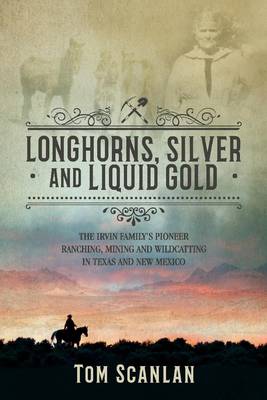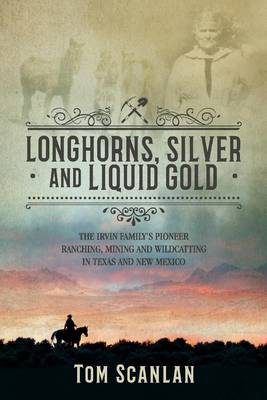
- Retrait gratuit dans votre magasin Club
- 7.000.000 titres dans notre catalogue
- Payer en toute sécurité
- Toujours un magasin près de chez vous
- Retrait gratuit dans votre magasin Club
- 7.000.000 titres dans notre catalogue
- Payer en toute sécurité
- Toujours un magasin près de chez vous
Longhorns, Silver and Liquid Gold
The Irvin Family's Pioneer Ranching, Mining and Wildcatting in Texas and New Mexico
Tom Scanlan
Livre broché | Anglais
22,45 €
+ 44 points
Description
This well-documented account of pioneering in Texas and New Mexico during those states' formative years focuses on just a single family. However, their story likely parallels the lives of many families that migrated from the eastern states to the still untamed Southwest at this time in our history. The Irvin family's story spans over one-hundred years, almost equally divided between their adventures in the hill country of west-central Texas, and in the rugged southwestern and northwestern corners of New Mexico. From the early 1840's to the late 1950's, four generations of Irvins tried their hand at cattle ranching, silver mining, land speculation, and drilling for gas and oil. Through good times and bad, this family persevered, just one family of many that helped settle these two great states.
Their story is told as it gradually unfolds during an extensive investigation of family trees, civil records, letters, photographs and old newspapers. There were initially huge gaps in the family's history. Numerous inconsistencies also had to be resolved. The search for answers eventually required personal visits to small, sometimes deserted towns in these two states. The research often took on the nature of detective work. Eventually a coherent picture emerged. Their story includes brief accounts of the geography and the history of those times and places in order to provide essential context.
The first generation of the Irvins to settle in Texas were farmers, but they soon left their farm and earned their living by rounding up and raising longhorn cattle. During these early years they survived the terrors of Comanche raids and the Civil War. The next generation continued cattle ranching but they were lured briefly to southwestern New Mexico Territory by the rich silver strikes of the 1870's. Here their lives were threatened on more than one occasion by raids from renegade Apaches and a complicated encounter with a notorious gang of cattle rustlers. Returning to west Texas, the next generation continued cattle ranching as the family expanded but they were eventually defeated by floods, drought, fences, and the economics of scale.
The Irvins finally chose to migrate all the way to northwestern New Mexico, seeking their fortune in a place where water was plentiful and commerce was just beginning to boom. They put down roots in the small but growing towns of Farmington and Bloomfield. Here, during the first and second World Wars, they prospered as ranchers and farmers. A few Irvins even tried their luck drilling for gas and oil, but this endeavor could be costly and sometimes tragic.
The life the Irvins chose when they abandoned their farms in the Southeast and set sail for the still turbulent Southwest was not an easy life. It was primitive and sometimes dangerous. It was often uncertain and unpredictable. But, in hindsight, it was grand!
Their story is told as it gradually unfolds during an extensive investigation of family trees, civil records, letters, photographs and old newspapers. There were initially huge gaps in the family's history. Numerous inconsistencies also had to be resolved. The search for answers eventually required personal visits to small, sometimes deserted towns in these two states. The research often took on the nature of detective work. Eventually a coherent picture emerged. Their story includes brief accounts of the geography and the history of those times and places in order to provide essential context.
The first generation of the Irvins to settle in Texas were farmers, but they soon left their farm and earned their living by rounding up and raising longhorn cattle. During these early years they survived the terrors of Comanche raids and the Civil War. The next generation continued cattle ranching but they were lured briefly to southwestern New Mexico Territory by the rich silver strikes of the 1870's. Here their lives were threatened on more than one occasion by raids from renegade Apaches and a complicated encounter with a notorious gang of cattle rustlers. Returning to west Texas, the next generation continued cattle ranching as the family expanded but they were eventually defeated by floods, drought, fences, and the economics of scale.
The Irvins finally chose to migrate all the way to northwestern New Mexico, seeking their fortune in a place where water was plentiful and commerce was just beginning to boom. They put down roots in the small but growing towns of Farmington and Bloomfield. Here, during the first and second World Wars, they prospered as ranchers and farmers. A few Irvins even tried their luck drilling for gas and oil, but this endeavor could be costly and sometimes tragic.
The life the Irvins chose when they abandoned their farms in the Southeast and set sail for the still turbulent Southwest was not an easy life. It was primitive and sometimes dangerous. It was often uncertain and unpredictable. But, in hindsight, it was grand!
Spécifications
Parties prenantes
- Auteur(s) :
- Editeur:
Contenu
- Nombre de pages :
- 250
- Langue:
- Anglais
Caractéristiques
- EAN:
- 9781098325633
- Date de parution :
- 10-11-20
- Format:
- Livre broché
- Format numérique:
- Trade paperback (VS)
- Dimensions :
- 150 mm x 226 mm
- Poids :
- 657 g







